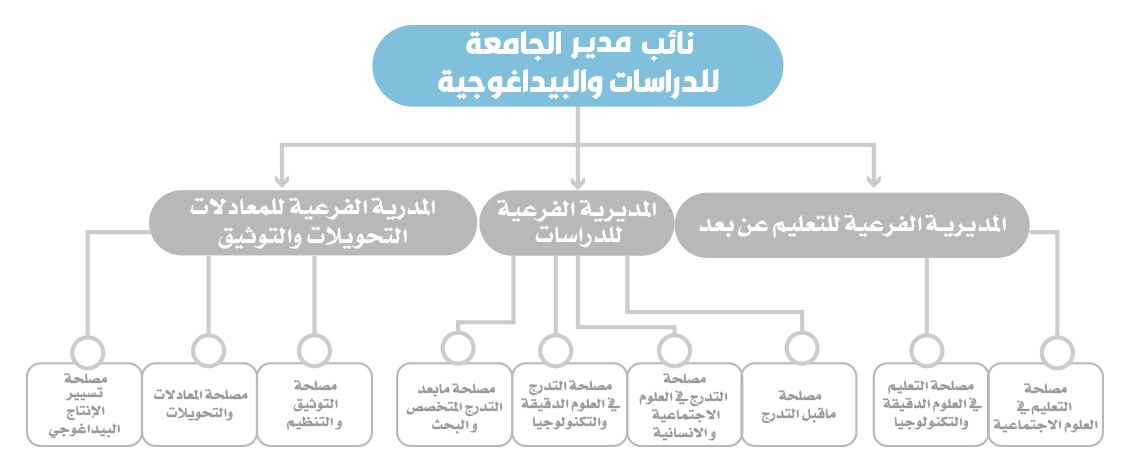
- Programming and overseeing enrollments
- overseeing curriculum and academic programs
- Ensuring a well-organized pedagogical system
- Study and propose all processes aimed at improving and developing knowledge.
- overseeing, coordinating, and preparing, in collaboration with the centers’ directors, the statistics and ensuring the communication with the supervisory authorities
- Preparing, in coordination and collaboration with the centers, examination programs.
- Preparation and overseeing of end-of-study certificates.
- overseeing and coordinating pedagogical resources
The Vice-Rectorate of Studies and Pedagogy in University of ContinuousTraining:
- Dedicating to the Quality of Training and MovingTowards Open Education :
The education and training associated with pedagogy are considered the backbone of the university. As part of modernization efforts, the directorate works on renewing content and curricula, adopting the latest educational methods and resources that align with global scientific and knowledge advancements. On one hand, this aims to meet the needs of the labor market, contributing to the economic and social development of the country. In this regard, Dr. ArabiGuenni, the Vice-rector responsible for pedagogy at the university, emphasized that the pedagogy of the university is linked to the quality of training, the quality of lessons, and the proper selection of professors and academic achievement. Focusing on these aspects means elevating the university, especially in the current period.
To achieve the set goals, the vice-rectorate of the university, along with other departments, works with a team spirit, initiative, and creativity, in line with theintended mission and new tasks that align with the nature of the stage and the direction towards distance education and open learning. The ambition to elevate the University of Continuous Training to the ranks of international universities in open education is a culmination of a valuable journey in specialized and distance education, which has gained over thirty years of experience. Through this journey, it has acquired human and technological capabilities that can continue and enhance this scientific trajectory, marking a new phase in its history.
- The importanceof distance education :
After the COVID-19 crisis, the experience of distance education has become global and has established itself as a solution to the interruption of traditional education. This mode of learning has numerous advantages. It has the capacity to accommodate the increasing number of students each year, offering them the opportunity to continue their studies, strengthen their academic knowledge, and advance their educational and professional paths in various fields. It also complements traditional in-person education to reinforce scientific knowledge. Additionally, it is resorted to in order to reduce economic costs.In terms of numbers, which reflect the level of interest and demand for this type of education, the University of Continuous Training has recorded record-breaking figures. Last year, there were 85,000 registrations across various disciplines, and ultimately, only 12,000 students were selected.
- The University of Continuous Training with its experience and expertise qualifies it to excel in distance education leadership in Algeria:
The path of The University of Continuous Training includes new training courses in distance education, offering qualification courses in bachelor’s and master’s degrees in fields of law, economics, and media and communication.The first group of students in 2021 continues their lessons normally through the distance learning platform, following the guidelines set by a national committee of experts. This committee outlined the teaching methodology, student evaluation methods, lesson content, and standards for training through this platform. The distance education process is coordinated between the active instructor, the accompanying instructor, and the course designer.
- Training projectson the horizon :
As part of the efforts of the Ministry of Higher Education and Scientific Research to align the University with serving the community and contributing to development, the rector of the University has issued directives emphasizing the importance of openness to the economic and social environment. This includes providing demand-driven training programs to meet the needs of the job market.Currently, the university is moving towards adopting professional master’s programs and engaging directly with economic institutions to offer training programs that align with their requirements. Additionally, there are plans to introduce amajorin technical English in the upcoming academic season, which will include suitable audiovisual educational materials.
- The strategy is based on investing in human and technological resources to usher in a new phase with the issuance of the basic law for the university:
The University of Continuous Training has devised ambitious plans, particularly in distance learning programs for bachelor’s and master’s degrees, as well as specialized formation courses targeting various sectors to develop and qualify professionals. With the forthcoming enactment of the basic law for The University of Continuous Training, which is currently under study, the university will enter a competitive atmosphere at the regional and global levels. This necessitates the adoption of advanced and up-to-date curricula that are globally recognized and taught in prestigious international universities. To achieve this global approach, the university aims to attract Algerian experts and professionals residing abroad who have expressed their willingness to teach and collaborate with the university. Additionally, the university is striving for decentralization in management and education by empowering its 53 regional centers throughout the country to oversee distance learning. It has also improved its physical infrastructure by signing agreements with partners to enhance the speed and accessibility of the online platform. Furthermore, the university envisions each specialization having its dedicated online platform. These initiatives, along with ambitious future goals, are part of a strategic plan focused on the quality of training, promising prospects, and aspirations for the future.
